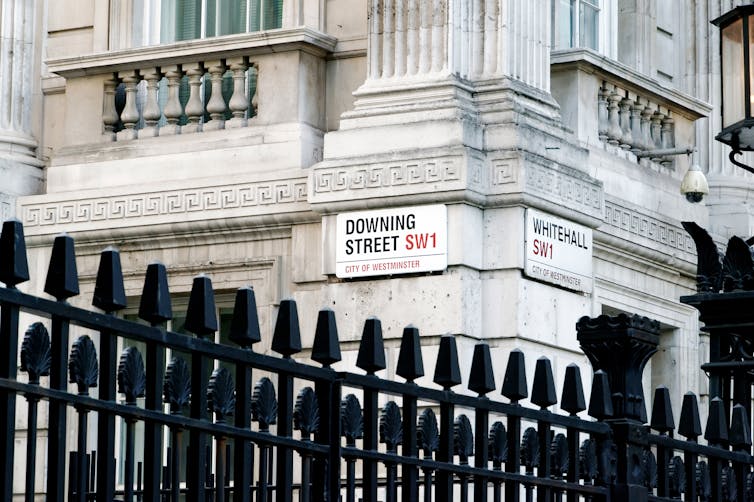Civil servants in Whitehall are worried. One of the first items on the agenda of the new conservative government is reforming the civil service. There are plans to restructure some government departments, close others and move functions around.
But it doesn’t stop with structural change. The prime minister’s chief policy adviser Dominic Cummings has long envisaged major reforms for the civil service. According to Cummings, Whitehall is staffed by “hollow men” who are plagued with group think and, he believes, would rather play it safe than get things done. To address this dire situation, Cummings has put forward a range of solutions including changing the way senior civil servants are appointed.
One idea that Cummings is particularly fond of is making greater use of politically appointed experts to staff top jobs in the civil service. This is hardly new, of course. Until the middle of the 19th century, the UK civil service was largely staffed by political appointees. In 1854, a report by Stanford Northcote and C. E. Trevelyan, two senior civil servants, pointed out that this method of staffing the civil service led to a system run by “the unambitious, the indolent or the incapable”.
The report therefore recommended civil servants be appointed on merit by an independent body rather than on the basis of their political patronage. These reforms created the basis for the independent civil service which largely persists up to today.
However, political appointees began to reappear during the 1960s. The first special advisers of the modern era were appointed by Harold Wilson, who brought in two highly respected economists. Their role was to conduct the government’s battles with a largely conservative civil service.
In 1974, Wilson increased the number of special advisers from a handful to 30. During the years of Conservative government that followed, the number of special advisers stayed fairly static, but they became younger. They were often appointed less for their expertise and more for their political commitments. When Tony Blair’s Labour government came to power in 1997, the number of special advisers almost doubled from 38 to 72. They not only increased in power but also in influence. This trend only continued. By 2015, David Cameron had 95. The latest figures available from December 2018 identify 99 special advisers.
This may not sound like a lot when compared to the 400,000 plus civil servants. However, special advisers often have significant power and influence. They often oversee and manage the activities of civil servants, acting as liaison between them and politicians, helping shape the agenda within the civil service.
Learning the ropes
If Cummings gets his way, the number and influence of these political appointees is likely to grow significantly. While his lengthy blog posts make the case for drawing in outside expertise, there is evidence that being too reliant on politically appointed advisers can be dangerous. Much of this comes from the United States, which operates on a patronage system. Each incoming administration can make around 4,000 political appointments in the federal government agencies.
Champions of political appointees claim they are likely to be more skilled and therefore more able to get the job done. This is only partly true. A study of the US federal government programmes found that political appointees did indeed tend to have higher levels of education and more varied experience than career bureaucrats. But federal programmes run by political appointees were systematically rated as less effective than those run by career civil servants.

This is, in part, because it takes a long time for a political appointee to learn the ropes in a public sector organisation. Newcomers to the civil service can bring a fresh perspective, but they also lack the detailed knowledge of the process of implementing their ideas. It can often take years to learn this, by which time political appointees have often grown frustrated and moved on.
During the Reagan administration, political appointees only had a tenure of around 1.7 years. Such rapid turnover is fairly common under most US presidents. Political appointees appear to spend more time learning the ropes than doing the job.
Another side effect of rapid turnover is that key leadership roles can remain vacant for some time. One study of the US federal government found that politically appointed roles were empty about one-quarter of the time. This meant departments were often rendered ineffective as they waited for new leadership.
Turkey farms
Political appointees often struggle to achieve much because their beliefs and leadership style are often quite different to careerists in the civil service they have to work with. Rather than generating creative tension, these differences often lead to corrosive conflict between political appointees and career civil servants. Such conflict reduces the effectiveness of the departments which they run.
There is also a significant danger that political appointees only pay attention to a selective set of signals. Because of the route through which they get their job, political appointees tend to focus on issues which their political masters care about.
One final damaging consequence of increasing the numbers of political appointees is that some parts of the civil service can become what US government insiders call “turkey farms”. These are the government departments that house loyal supporters of a ruling party who aren’t much use.
These “turkeys” end up in the parts of government where they can do the least harm. However, as a department gets crowded with turkeys, it becomes increasingly ineffective and bungling. And since no government department is entirely without use, the turkeys can end up causing real damage.
This is what happened to the Federal Emergency Management Agency. For decades, the organisation was seen as a turkey farm with incompetent leadership. And, when faced with large-scale emergencies such as hurricanes, FEMA has often responded in a bungling way. The consequences were made all too plain during the hopeless response when Hurricane Katrina hit New Orleans in 2005.
However, this is not to say appointed advisers have no place at all in government. Giles Wilkes, a former special adviser in Whitehall, makes a compelling case for using them to manage the day-to-day bargaining process involved in making a government. A survey of special advisers in the UK government also found that they spent the majority of their time acting as political “fixers”, some of their time designing policy and spending much less time on policy delivery.
By acting as a liaison between politicians and the bureaucracy, appointed officials can – in the best cases – smooth the way in the implementation of new policies. But the evidence from the US seems to suggest that political appointees are often much less useful at getting things done in government in a way which sticks in the long term.

